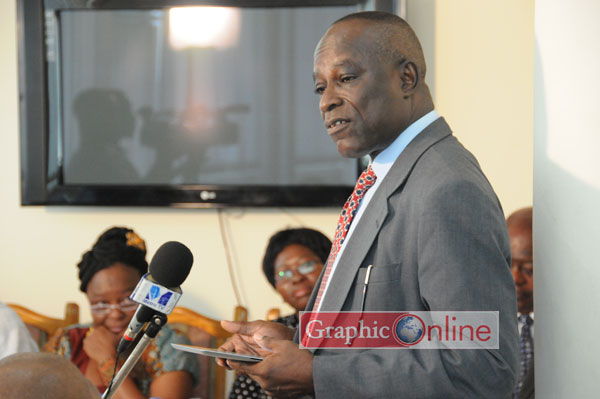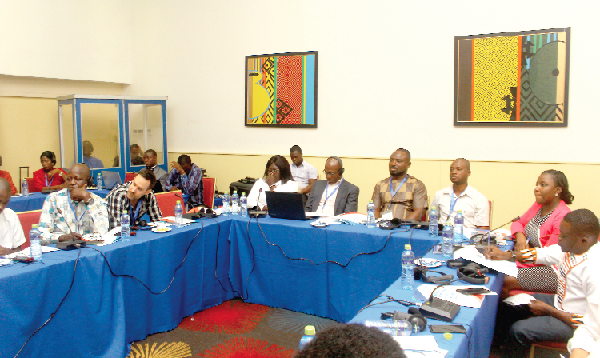
Press freedom under threat - From politicians who own media organisations
Politicians owning media outlets in Ghana represent one of the greatest threats to media freedom in the country, a former Chairman of the National Media Commission (NMC), Mr Kabral Blay-Amihere, has said.
Advertisement
“If you look at the more than 400 radio and television stations in Ghana, it looks good for media pluralism, but a lot of them are owned by politicians or their surrogates. It does a lot to affect the integrity of the media,” he said at the opening ceremony of the West Africa Conference on Investigative Journalism in Accra yesterday.
Notable radio and television stations in Ghana owned by politicians include Radio Gold, Oman FM, Net 2, FM, Starr FM, GHONE TV, GNTV,
For newspapers, the list
Mr Blay-Amihere said in the wake of social media and Internet growth, advertising and circulation rates had dropped significantly, compelling some journalists to be in bed with politicians.

Some participants in the conference.
The conference
Organised by the Media Foundation for West Africa, with the support of DW Akademie, the two-day conference has brought together seasoned investigative journalists from across the sub-region to deliberate on the current state of investigative journalism, challenges and practices in the sub-region.
The conference is also to serve as a platform for cross-border exchanges among journalists, as well as provide an opportunity for synergies and networking.
Corruption
Although the Internet and social media were threatening the relevance of traditional media, Mr Blay-Amihere said, traditional media would continue to remain relevant but journalists would have to offer deeper analysis even as the Internet opened space for citizen journalists to also circulate news.
Mr Blay-Amihere, who was Ghana’s Ambassador to Cote d’Ivoire in the Kufuor administration, observed that corruption continued to be a major hindrance to the development of the continent, arguing that “investigative journalists are the light that would shed on the darkness”.
He cited the example of Ghana’s ace investigative journalist, Anas Aremeyaw Anas, and Manasseh Azure Awuni, who he said
“The work of Anas, for instance, has caused football in Ghana to reinvent itself. We need investigative journalists to ensure that citizens enjoy the fruits of their resources and taxes,” he posited.
According to him, today the environment for investigative journalism was more fertile than ever before, as the dictatorial regimes in West Africa that terrorised journalists in the past were no more.
He, therefore, rallied journalists on the continent to rise to the occasion to bridge the gap between inequality and social injustice.
Journalism after dictatorship
The Executive Director of the Media Foundation for West Africa, Mr Sulemana Brimah, noted that while the democracy that the media fought for in the days of military dictatorship had come, its dividends in the shape of good governance had been elusive.
“We always say that West Africa is well endowed with everything a nation should have for development, be it natural resources, population and the quality of land. So you still ask yourself why the majority of people are living in deprivation and can’t even access basic amenities like water and quality health care,” he said.
“It is about the quality of the governance that we have. Now the other challenge is that even though we have thousands of media houses, thousands of journalists, as opposed to those years, we as journalists are not asserting ourselves that much. If we have anything to fight for, we have to fight for the quality of governance. We are not there yet,” he added.
Mr Brimah said across the region, citizens did not have access to basic information, but where laws had been passed to have access to information, they remained just laws.
He cited countries, including Nigeria, Liberia, Togo, Niger, Burkina Faso and, to some extent, Benin, that had passed the right to information law but citizens were still denied the right to information.
He said the conference provided an opportunity to take stock of investigative journalism on the continent and what could be done to empower more journalists to hold duty bearers accountable while the needs of citizens were met.
Inspiring investigative journalism
Contributing to a discussion on
While acknowledging that journalists were often poorly remunerated, he said those who looked to their salaries for inspiration to deliver would not be able to fulfil their mandate.
The Lead Consultant of
“We also tasked all page editors to think about investigative stories for the paper. That is how we turned around the fortunes of our newspaper, which was suffering a decline in circulation,” he said.



